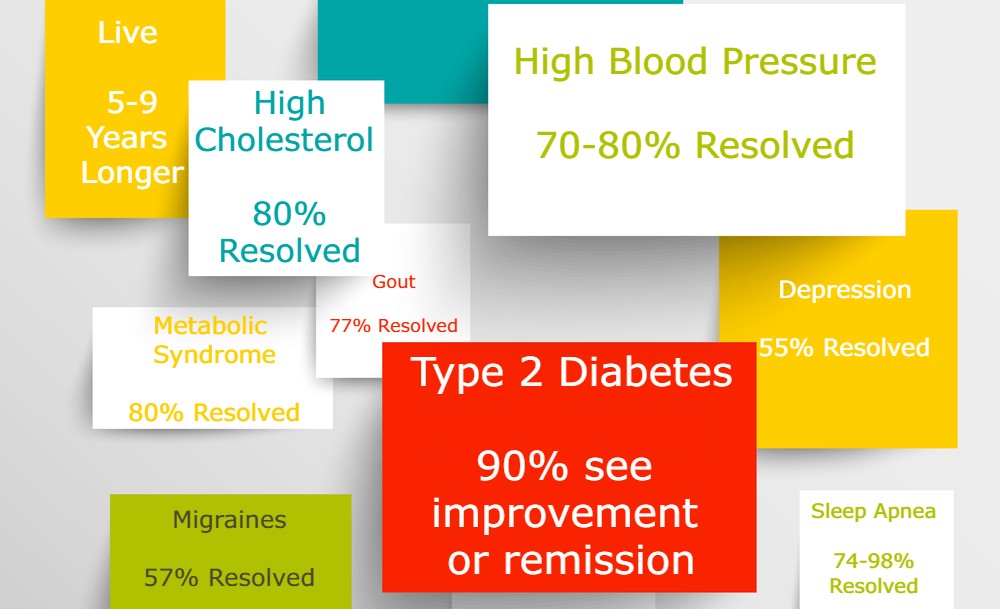It’s hard to miss. Seventy-three percent of American adults are overweight with a body mass index (BMI) over 25. And forty-two percent of adults have obesity – a BMI over 30.
It’s clear people are trying to lose weight – each year, 33 billion dollars are spent on weight-loss products. People often lose significant amounts of weight with diet and exercise. However, it is rare to keep the weight off – the odds are less than 3%. What’s going on? There is a disconnect somewhere.

Even while eating a modest number of calories, the body’s powerful mechanisms cause it to return to its set-point weight. It’s discouraging. Time, energy, and money are invested into what seems to be a solid nutrition plan, exercise program, or medication. There are results. But then, leptin (the satisfaction hormone) decreases, and ghrelin (the hunger hormone) increases. The person is powerless as the scale creeps upward – often past the starting weight.
Obesity isn’t as simple as carrying around extra weight. It is a complex metabolic disease – stressing and straining every system in the body. As time passes, obesity-related conditions crop up, health deteriorates, and quality of life decreases.
There is an answer and an effective treatment for obesity – bariatric surgery. In contrast to diet and exercise alone, bariatric surgery causes a change in hormones, reducing hunger and promoting fat loss. It typically results in long-term weight loss. (2)
If you’re considering bariatric or weight loss surgery, you have questions. Here are some bariatric surgery statistics and facts to know as you look into options for treating and resolving your obesity.
How Many People Have Weight Loss Surgery?
Over 250,000 people had bariatric surgery in 2021. (1)
How Much Weight Can I Lose With Bariatric Surgery?
Success after weight loss surgery is defined as losing at least 50% of excess weight and keeping it off for five years or more. About 90% of people reach that goal. Many people lose more. The amount of weight that is lost and kept off depends on several factors:
- Age
- Amount of extra weight to lose
- Other health conditions and medications
- Type of bariatric surgery
- Physical ability to exercise
- Following nutrition/lifestyle recommendations
- Support of family and friends
Weight Regain After Weight Loss Surgery
Even those most successful with weight loss surgery can experience some weight regain. Weight loss surgery overcomes the robust systems the body has to return to its higher set point. But, after surgery, many things have not changed. Jobs are still sedentary. Fast food is still convenient. Large sums of money are spent to market obesity-promoting foods, while virtually no money is spent promoting lean proteins, vegetables, and fruits. A high priority on health must stay in place to overcome daily temptations. In simple terms, maintaining a healthy weight takes work.
Up to 1/3 of people will regain more than 15% of their initial weight loss within 2-5 years of surgery. (5) This can happen for several reasons:
- Change in anatomy – enlargement of the stomach or stomach outlet
- Physiological – altered fat metabolism resulting in easy fat storage and reduced fat burning
- Psychological – depression, lack of self-efficacy, binge eating, alcohol or drug dependence
- Behavioral – inactivity, not following eating guidelines, grazing (unplanned and repetitive eating of small amounts of food)
To prevent regain, stay in close contact with your bariatric team after surgery. At Barix Clinics, follow up appointments are scheduled with the surgeon (or physician’s assistant) and the nutritionist 2 weeks, 6 weeks, 3 months, 6 months, 9 months, 12 months and then annually after surgery. We help you put behaviors in place that support a healthy weight for the long-term.
If you do start to regain weight, reach out to your nutritionist and your surgeon’s office right away. We are here to help. You may be a candidate for weight loss medication or benefit from more structured nutrition guidance.
Does Weight Loss Surgery Help People Live Longer?
Yes, it’s estimated that people without type 2 diabetes will live 5.1 years longer with weight loss surgery. Those with Type 2 diabetes increase their life expectancy even more – by 9.3 years. Both gastric bypass and gastric sleeve surgery provide this astounding result. (3)

Is Bariatric Surgery Safe?
On its website, the American Society for Metabolic and Bariatric Surgery shares that weight loss surgery is safer than gallbladder or knee replacement surgery. There are short-term and long-term risks from any surgical procedure. To determine if your individual benefits outweigh potential risks, attend a consultation with a bariatric surgeon and discuss with your primary care physician.
As a result of a long-term commitment to patient safety, Barix Clinics in Ypsilanti, Michigan, has earned the CareChex® 2022 Patient Safety Award for bariatric surgery, recognizing them as the safest hospital in the Midwest. State-of-the-art technology, experienced surgeons, and decades of caring for weight loss surgery patients set Barix Clinics apart from other providers.
Is Type 2 Diabetes Cured with Weight Loss Surgery?
In the first few weeks after surgery, 90% of people with type 2 diabetes see improvements in blood sugar control and are able to reduce or eliminate medications.
Although many people have normal blood sugar levels and no longer require medication, weight loss surgery isn’t necessarily a cure for type 2 diabetes. Perhaps remission is a better description because there is the potential for relapse over time.
Even if it’s not a cure, bariatric surgery is more effective in treating type 2 diabetes than medication. Researchers of one study stated, “Bariatric surgery is believed to be the only reliable means of achieving diabetes remission.” (4)

Do Other Health Conditions Improve with Weight Loss Surgery?
Effectively treating obesity with weight loss surgery brings about remarkable improvements in many weight-related conditions.
Hypertension (High Blood Pressure)
Within six months of surgery, more than 70% of those taking medication to control high blood pressure have normal blood pressure readings without medication.
Heart Disease
There’s an 83% lower risk of heart disease after weight loss surgery. It’s no wonder since bariatric surgery improves many of the conditions that lead to heart disease:
- High cholesterol – 80% resolved
- High blood pressure – 70% resolved
- Sleep apnea – 74-98% resolved
- Type 2 diabetes – 90% improved
Breathing Problems
Shortness of breath, experienced by many with obesity, improves quickly with weight loss seen in the first months following surgery. Sleep apnea, where breathing repeatedly stops and starts while sleeping, is resolved in 74-98% of people. Asthma is improved or resolved in 82% of people. Oxygen once again circulates freely through the body, boosting energy, helping to replace worn-out cells, and supporting the immune system.
Aches and Pains
Relief to the aches and pains of the hips, knees, feet, and lower back is swift. It often begins the first month after surgery as inflammation cools and then more relief comes with additional weight loss. It’s tremendous – each pound of weight loss takes six pounds of pressure off the knees. With less pain, there is a greater inclination to get out and enjoy life more.
Other Medical Conditions
Those undergoing bariatric surgery see marked improvements in other medical conditions:
- Pseudotumor cerebri – 96% resolved
- Non-Alcoholic Fatty Liver Disease – 90% improved stenosis
- Metabolic Syndrome – 80% resolved
- Polycystic Ovarian Syndrome (PCOS) – 79 -100% resolved
- Venous Stasis Disease – 95% resolved
- Gout – 77% resolved
- Depression – 55% resolved
- Degenerative Joint Disease – 41-76% resolved
- Migraines – 57% resolved
- Stress urinary incontinence – 44-88% resolved
Does Insurance Pay for Bariatric Surgery?
Insurance coverage is a necessary consideration for most people. Fortunately, many commercial insurance plans, Medicare, Blue Cross, and BlueCare Network, will cover bariatric surgery if specific criteria are met. The majority of insurers require:
- A body mass index (BMI) of 40 without an obesity-related condition**
- A BMI of 35 or greater with an obesity-related condition
- Past attempts at weight loss
- Pass a physiological exam
- Some insurers may require smoking cessation
- Some insurers require you to work with a physician to change eating habits before surgery
- Some insurers require a nutritional evaluation with a registered dietitian
**Medicare requires everyone to have an obesity-related condition (comorbidity) regardless of BMI.
The out-of-pocket cost for the patient depends on the co-pay and deductible amounts of the insurance plan.
The Bottom Line
When patients start to lose weight after surgery, they feel more energetic, have less pain, and are more enthusiastic about getting out and experiencing life. Weight-related health conditions improve and a better quality of life is achieved.
References
(1) Long-term Study of Bariatric Surgery for Obesity: LABS https://www.niddk.nih.gov/about-niddk/research-areas/obesity/longitudinal-assessment-bariatric-surgery
(2) Bariatric Surgery FAQs: Patients: ASMBS https://asmbs.org/patients/faqs-of-bariatric-surgery
(3) https://www.jwatch.org/na53611/2021/05/25/bariatric-surgery-associated-with-longer-life-expectancy
(4) Arterburn, David, et al. “Comparative effectiveness of bariatric surgery vs. nonsurgical treatment of type 2 diabetes among severely obese adults.” Obesity research & clinical practice vol. 7,4 (2013): e258-68. doi:10.1016/j.orcp.2012.08.196
(5) Firat, Ozgur. “Weight regain after bariatric surgery.” Annals of Laparoscopic and Endoscopic Surgery [Online], 6 (2021): n. pag. Web. 15 Jun. 2022

